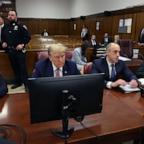Jordan's King Abdullah Open to Constitutional Monarchy
WASHINGTON, March 15, 2005 — -- President Bush hosted Jordan's King Abdullah II in an Oval Office meeting today. The two men are publicly enthusiastic about some of the recent changes in the Middle East -- among them, the elections in Iraq, a sliver of democracy emerging in Egypt and Saudi Arabia, and massive protests in Lebanon calling for the Syrian military to withdraw. After the White House meeting, King Abdullah spoke with ABC News' Peter Jennings.
The following is the full transcript of the interview, a portion of which aired on "World News Tonight with Peter Jennings:"
PETER JENNINGS:Let me ask you first, sir, what is happening in the region?
KING ABDULLAH:Oh, there's so many things happening in the region. We have obviously the issue of reform in Egypt, we have elections coming up in Lebanon. Iraq, last month had very successful elections, and we're looking for help, a momentum that moves toward new elections at the end of the year, which will be I think the new face of Iraq. Obviously we have the problems in Lebanon and Syria. It's going to be a very busy year for all of us.
JENNINGS:What do you think it all means? Taking just what most Americans regard as the positive note, elections in Palestine, elections in Iraq, the slight elections in Saudi Arabia and the slight changes in Egypt?
ABDULLAH:Well, I think that there's a positive trend that reflects the desire of the people. I think that, you know, President Bush called for Middle East reform last year, it had initially been taken in the wrong context by Arab countries as something being forced upon them, but it created debate inside of Arab society and I think we're seeing the fruits of that. I think people are expecting leaders to reform, and are demanding from their governments to move forward.
JENNINGS:Do you believe that President Bush gets a lot of personal credit for what is happening there at the moment?
ABDULLAH: Well, I think if the president had not started the process of getting reform in people's minds, we would have been much more complacent. But because there was outside pressure, people had to look in the mirror and think of how to move forward.
JENNINGS:And what do you think is the outside pressure? Because I think Egyptians and Palestinians and Lebanese would tell you they've been arguing for reform for years.
ABDULLAH: Well, I think that many societies throughout the Middle East have been talking about reform, but obviously there seems to, and may be a strong American position for the Middle East to move toward reform. I believe that European countries are also endorsing that. So, for example, in Jordan it has allowed us to actually push the envelope even more. And if there hadn't been that call, then I think that we'd have been much more complacent about it.
JENNINGS:What do you think is happening inside Syria?
ABDULLAH:I think they're probably asking themselves the same question. They obviously have a problem with the international community, there is, you know, [U.N. Security Council] Resolution 1559 that calls for a Syrian pull out of Lebanon. And I hope that they will deal with the pressure from the international community and move in the right direction.
JENNINGS:Do you think Syria's a dangerous place at the moment?
ABDULLAH:No, I don't think Syria's a dangerous place. I have good relationships with the president and from my dealings with him, he understands that there needs to be some resolvement of these issues from the Syrian government, and we're hoping that it will be done peacefully and as smoothly as possible. (Overlap)
JENNINGS:This is pretty unusual for a Syrian president to willingly withdraw from Lebanon?
ABDULLAH:Obviously, there's a lot of history between Lebanon and Syria, and it's very different for the Syrians to pull out, but I think there is a commitment by the international community, and I think the Syrians realize that.




